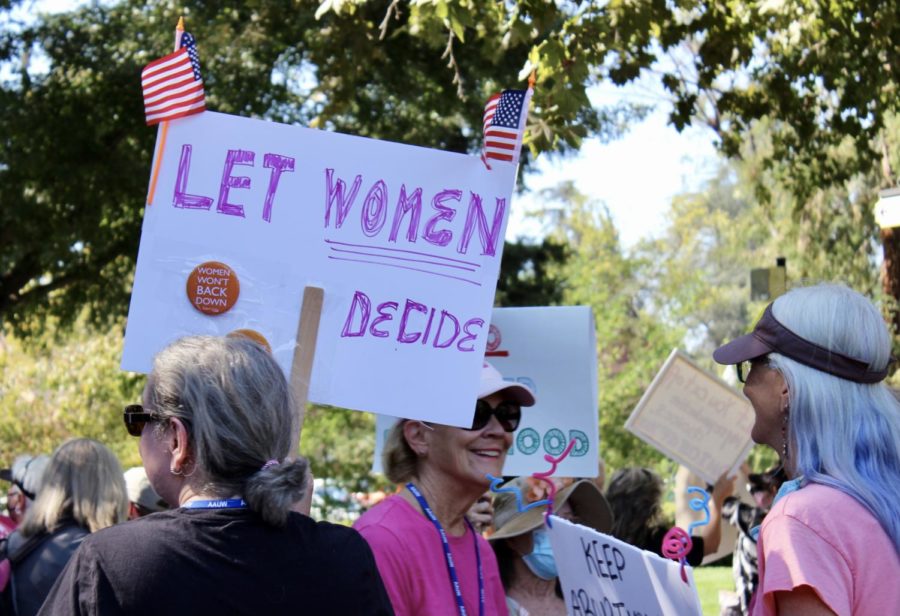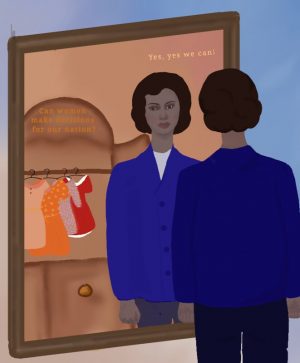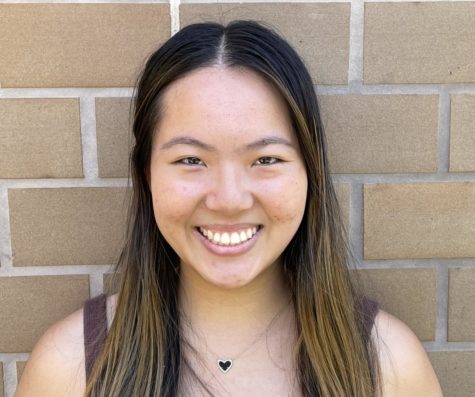San Ramon Valley residents protest to defend women’s reproductive rights
Women gather together in union at downtown Danville to protest against the abortion laws.
October 19, 2021
The Mississippi abortion law, followed by the Texas abortion law, threatened women’s decisions about their own bodies and led to nationwide protests, one of them being the Women’s March held in Danville, California at 2 p.m. on Oct. 2.
With over 300 people who RSVP’d, people of different backgrounds, races and genders gathered in front of Danville Library and marched in a loop around the block protesting their mutual opinions by holding up signs that conveyed strong messages such as “Censoring Women’s bodies is colonization”, “Texas made a liar out of me!” and “A mother BY choice FOR choice”.
History of the Abortion Laws and its implications
The U.S. has had a long-standing history of debating about whether or not abortions should be legal, with the first abortion ban being passed in Connecticut in 1821. Since then, many states have passed their own abortion bans.
In 1971, Norma McCorvey, who used the pseudonym Jane Roe, challenged Texas’s abortion ban after she unsuccessfully tried to get an abortion. During the case, known as Roe v. Wade, McCorvey’s defense argued that the ban was unconstitutional because it infringed on a women’s right of personal privacy. In 1973, the Supreme Court ruled that states cannot take away a woman’s right to get an abortion during the first trimester of her pregnancy, can only impose certain regulations during the second trimester, and can regulate or ban abortions during the third trimester, except when the mother’s health is in danger.
On Sept. 1, Texas’s governor, Greg Abbott, passed another abortion ban, known as the Texas Heartbeat Act, which banned abortions after six weeks into a pregnancy, around the time when a fetal heartbeat can be detected. The ban also allowed private citizens to sue those who help women get abortions. Many have protested against this because most women aren’t aware that they’re pregnant until well after the six-week mark, meaning that their right to have an abortion would be revoked by the time they find out. Further outrage was sparked after the Supreme Court declined to rule the act unconstitutional, with 5 of the 9 court members refusing to block the law.
Abortion ban advocates have been trying to pass an anti-abortion law in Mississippi that bans most terminations after 15 weeks into a pregnancy. Once again, many have expressed their disapproval because the fetal viability standard, or the time when a fetus is capable of surviving outside of the uterus, is around 22 to 24 weeks. The law, which was initially proposed and blocked by the lower court in 2018, will again be discussed by the Supreme Court on Dec. 1. If the Supreme Court allows the law to pass by overruling Roe v. Wade, the criminalization of all abortions could potentially spread nationwide because women’s right to privacy and choice will be revoked.
Reaction to the Injustice created by the Abortion Laws
For decades, the United States has been implementing legal actions to prevent access to abortion. The government provides resources such as legally mandated counseling and waiting periods during the pregnancy to try and sway a decision made by a woman to end her pregnancy. Now, with the Texas abortion law, women no longer have the ability to choose and are forced to carry the pregnancy to full term once a heartbeat is detected. Texas Gov. Abbott defended the Texas Abortion Law by stating that the law provides every child a chance to live.
“Our Creator endowed us with the right to life and yet, millions of children lose their right to life every year because of abortion. In Texas, we work to save those lives,” Abbott claimed in the video of him signing the law. “[The Texas legislature] worked together on a bipartisan basis to pass a bill that I’m about to sign that ensures that the life of every unborn child who has a heartbeat will be saved from the ravages of abortion.”
Dr. Karen Swallow Prior, a research professor at Southeastern Baptist Theological Seminary, shares similar views, emphasizing that the law ultimately works to protect the lives of unborn children.
“If we start from the biological and ontological reality that each human life begins at conception, the law is hardly ‘extreme,’ as President Biden has called it. A law preserving the life of a human being at any stage can be considered ‘extreme’ only within a distorted social context,” Prior said.
Veronica Benjamin, a 33-year-old human rights activist at the Women’s March in Danville, disagrees with Abbott and Prior.
“It’s propaganda, a misinformation campaign amongst the supporters of this new law … That’s just a biological reflex at that [six-week] point. It’s not a heart. It’s not functioning as a heart,” Benjamin said. “I think the ‘50s really pushed to make it seem like abortion was killing babies, rather than halting a biological process that had not yet materialized into an independent human life.”
In states that have adopted abortion laws, women are subject to what the government wants instead of what they want, and this is what caused the nationwide uproar among women; they were not going to let the government seize their constitutionally protected rights.
“It’s really up to the person to choose. I don’t want people to have to mess with other people’s decisions and bodies … Telling people what is right and wrong is such a psychological need of the American population. I just don’t get it,” Benjamin said.
However, many anti-abortion activists have suggested that there are always alternatives to abortion, stating that pregnant women have the options of seeking help from programs with services for unexpected pregnancies or giving up the child for adoption after birth.
“Everything about [pregnancy] centers — and their life-affirming pregnancy services — destroys the narrative that pro-lifers don’t care about the baby and mother after the baby is born. These centers represent our care and concern in action. That is why the legislature continues to increase their support,” Jennifer Allmon, the executive director of the Texas Catholic Conference of Bishops, said.
Prior notes that though these centers could be effective, there are still many health concerns regarding carrying unplanned pregnancies to full term.
“The Texas law ought to compel us to help women with unwanted pregnancies in meaningful ways,” Prior said. “The millions of dollars that Texas lawmakers have allocated to the Alternatives to Abortion program, which offers support to those who ‘choose life in difficult circumstances,’ is a start.”
Dr. Kimberly Chong, a pediatric physician at the Palo Alto Medical Foundation, agreed that if legislatures criminalize abortions, then more effort needs to be put into providing birth control and pregnancy services before an abortion.
“Planned Parenthood clinics [are] being closed all over the country … So people have no access to birth control … If [the government] wants people to not have abortions, then [they] need to give [women] more easy and free access to birth control,” she said. “It’s kind of a hypocritical thing where [they] say we’re not going to give birth control, and [women] can’t have an abortion either. It’s just putting people in a box.”
Another part of the Texas Abortion Law states that anyone who performs or assists in an abortion after the heartbeat of the newborn is detected can be sued for at least $10,000. Consequently, women are left on their own to make an important decision and cannot discuss it with people who could provide valuable information.
“It makes the woman feel more isolated because she doesn’t know who she can ask for help,” Ainsley Bliss, a senior who recently made a podcast episode on the Texas Abortion Law called “Who Owns it,” said.
In every state, locals organized women’s marches to send a message to the Supreme Court that the Texas Abortion Law must be stopped before more of the population is affected.
“It’s only a matter of time before neighboring states in the Bible Belt [south] follow suit and implement their own abortion bans … it’s really important for them to stop at where it’s at right now before it [spreads] hundreds and hundreds and hundreds of miles east and west [so] that nobody can get an abortion and women are stuck,” Sophie Bloch, the host of the Women’s March in Danville, said.
Benjamin agrees with Bloch on how the Supreme Court must take action immediately.
“It’s imperative for the Supreme Court to call [the Texas Abortion Law] out for what it is, as unconstitutional against the values that have been decided at the highest level of our judiciary’s government,” Benjamin said.
On Oct. 6, Federal District Judge Robert L. Pitman granted the Justice Department’s request to halt enforcement of the Texas Abortion Law. However, on Oct. 14, the 5th U.S. Circuit Court of Appeals reinstated the law by staying Judge Pitman’s ruling. The Biden Administration is now requesting the Supreme Court to hear the case again and block the law, despite them declining to rule the law unconstitutional last month.
What we can do for future generations
For over a century, anti-abortion (pro-life) and pro-abortion (pro-choice) advocates have constantly debated over the legality and morality of abortions. Over and over again, abortion-rights movements have risen in the United States as legislatures attempted to pass anti-abortion laws.
At the Danville Women’s March, one of the protesters’ main objectives was to create a permanent change so future generations wouldn’t have to fight for their right to choose what is necessary for their body and their life.
Chloe Castillo, a junior from Northgate High School, said, “I have two other sisters who are both younger than me and … I really don’t want them to go through all that. I feel like I can stand up for our rights and help the future women who are going to grow up in our society.”
Benjamin shared a similar sentiment, highlighting the importance of solidarity and encouraging young people to be proactive when it comes to making a change.
“In terms of having an impact, looking at those connections and those players in local government is something that we should consider. [You can] look up to someone involved in a high level of politics, but you can have so much more impact locally like running for town councils,” she said.
One of the protestors at the Danville march, Kristin Chambers, demonstrated the impact of becoming involved in local organizations. As a volunteer and former board member for Planned Parenthood, Chambers worked to deliver healthcare related to reproductive health for women, such as birth control, cancer screenings and abortions.
“I just think that we all have an obligation to make the world a better place for people who maybe can’t make the world better for themselves,” Chambers said.






